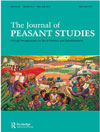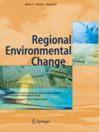-
Reaching Accord on Land Grabs, and Household Perceptions of Climate-Conflict Vulnerability
February 9, 2017 By Azua (Zizhan) Luo Large-scale land acquisitions, otherwise known as “land grabbing,” are often believed to lead to resistance from affected local communities. According to an article by Ruth Hall et al. in The Journal of Peasant Studies, however, “political reactions ‘from below’ to global land grabbing have been vastly more varied and complex than is usually assumed.” The authors write that community resistance does sometimes result in benefits and some groups are more likely to cooperate with corporate actors than others. The event of incorporation or acquiescence – the demand to be included in land deals as workers or contract farmers, or acceptance of changes without protest – depends on numerous factors including class and identity politics, local and transnational alliances, and use of legal and extralegal negotiation methods. The authors suggest further research on gendered responses and intergenerational relationships to further understand how groups respond differently to land deals.
Large-scale land acquisitions, otherwise known as “land grabbing,” are often believed to lead to resistance from affected local communities. According to an article by Ruth Hall et al. in The Journal of Peasant Studies, however, “political reactions ‘from below’ to global land grabbing have been vastly more varied and complex than is usually assumed.” The authors write that community resistance does sometimes result in benefits and some groups are more likely to cooperate with corporate actors than others. The event of incorporation or acquiescence – the demand to be included in land deals as workers or contract farmers, or acceptance of changes without protest – depends on numerous factors including class and identity politics, local and transnational alliances, and use of legal and extralegal negotiation methods. The authors suggest further research on gendered responses and intergenerational relationships to further understand how groups respond differently to land deals. In an article recently published in Regional Environmental Change, Uche Okpara, Lindsay Stringer, and Andrews Dougill discuss the development and application of a climate-water conflict vulnerability index to assess communities along the southeastern shores of Lake Chad in the Republic of Congo. The authors surveyed 240 resource users, including farmers, fishermen, and pastoralists, to determine household-level stressors in an attempt to uncover environmental conflicts between local communities. Out of the three groups, pastoralists reported feeling most vulnerable to water scarcity, while farmers reported high vulnerability to conflicts and aggression due to the encroachment of pastoralists onto farmland. This resource scarcity and disparity underlies approximately three quarters of all conflicts reported in the surveyed villages, according to the authors. Fishermen reported more vulnerability to climate-related losses but were better supported through social and political networks. The authors suggest development interventions for the villages target insufficient water supplies to decrease climate conflicts.
In an article recently published in Regional Environmental Change, Uche Okpara, Lindsay Stringer, and Andrews Dougill discuss the development and application of a climate-water conflict vulnerability index to assess communities along the southeastern shores of Lake Chad in the Republic of Congo. The authors surveyed 240 resource users, including farmers, fishermen, and pastoralists, to determine household-level stressors in an attempt to uncover environmental conflicts between local communities. Out of the three groups, pastoralists reported feeling most vulnerable to water scarcity, while farmers reported high vulnerability to conflicts and aggression due to the encroachment of pastoralists onto farmland. This resource scarcity and disparity underlies approximately three quarters of all conflicts reported in the surveyed villages, according to the authors. Fishermen reported more vulnerability to climate-related losses but were better supported through social and political networks. The authors suggest development interventions for the villages target insufficient water supplies to decrease climate conflicts.Sources: The Journal of Peasant Studies, Regional Environmental Change.
 A Publication of the Stimson Center.
A Publication of the Stimson Center.





